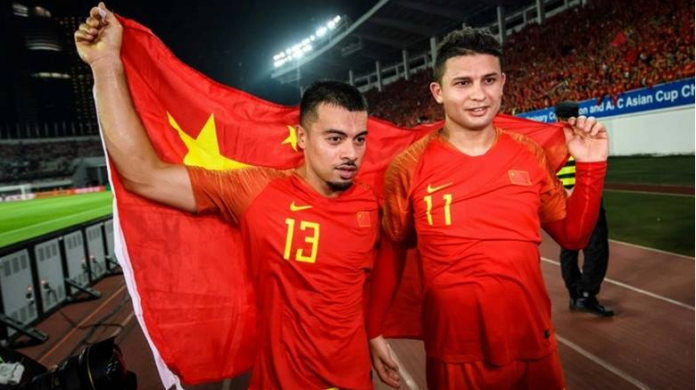However, naturalised forwards Elkeson and Aloisio are both in coach Li Tie’s current squad while Goulart, Alan and Fernando are reportedly close to call-ups having finalised or nearly finalised the paperwork to play for China.
Fernando skips down the wing and crosses for Ricardo Goulart, who tees up Elkeson to smash the ball into the top corner.
Alan and Aloisio join in some Samba-style celebrations as a goal made in Brazil propels China to the 2022 World Cup.
It is the stuff of make-believe, but the world’s most populous nation will soon be able to field a team with a distinctly Brazilian flavour.
Despite making Elkeson the first Brazilian-born player to represent their national team last year, China’s hopes of reaching only a second World Cup hang in the balance after a lacklustre qualifying campaign so far.
However, naturalised forwards Elkeson and Aloisio are both in coach Li Tie’s current squad while Goulart, Alan and Fernando are reportedly close to call-ups having finalised or nearly finalised the paperwork to play for China.
All five were born in Brazil, are offensive players and, according to transfermarkt.com, are contracted to Fabio Cannavaro’s Chinese Super League (CSL) champions Guangzhou Evergrande.
Another Evergrande player, the former England youth defender Tyias Browning, could also represent China this year.
It accelerates a strategy, started under ex-coach Marcello Lippi, to bring in naturalised players to bolster a squad that remains thin on talent.
“Since 2019, Guangzhou Evergrande has helped (these) six players… get their Chinese ID cards and their household registration in Guangzhou,” the state-run Guangzhou Daily said.
“At the same time, Guangzhou Evergrande and the Chinese Football Association have been actively promoting these naturalised players to qualify for the Chinese men’s national football team.”
Evergrande spent 870 million yuan ($122 million) in transfer fees, wages and other costs on the six players, Soccer News said, citing the club’s annual report.
Soccer News said that seven naturalised players could pull on China’s red shirts this year as the country attempts to qualify for the fifa World Cup.
The seventh is Beijing Guoan’s London-born Nico Yennaris, who became China’s first naturalised footballer when he made his debut last year and is now known as Li Ke.
The 26-year-old former Arsenal and England youth midfielder, whose mother is Chinese, was named alongside Elkeson and debutant Aloisio in the squad that is now in Shanghai for a training camp.
It is the first time in Chinese football history that three naturalised players have been called up.
The squad will be limited to practice matches because international games — among them World Cup qualifiers — are suspended because of the coronavirus pandemic.
Although football success, including hosting and even winning the World Cup, is a stated ambition of President Xi Jinping, China’s hopes of reaching the 2022 World Cup are in real jeopardy.
Italian World Cup winner Lippi quit for a second time in November after China lost 2-1 to Syria, despite the presence of Elkeson — Chinese name Ai Kesen — and Yennaris.
The defeat left China trailing the Group A leaders by eight points, albeit with a game in hand.
The top team in each group automatically reaches the next stage of qualifying, along with the four best runners-up.
Recruiting foreign-born players is not unique to China but it is a new approach for the country and some experts, fans and former players have voiced concern about the quick-fix policy.
Chinese state media has generally taken the line that as long as they improve the national side and win their places on merit, they deserve to play.
China are desperate to get to the World Cup again having made it only once, in 2002, when they were dumped out after failing to score a goal or win a point.
That the Brazilians are all attacking players reflects how badly China have struggled for goals in recent years.
China’s approach also mirrors a trend seen at Chinese clubs, including Guangzhou Evergrande whose eight national titles and two Asian Champions League wins have relied heavily on South American talent.
Ahead of giving the 31-year-old Aloisio his call-up, Li signalled that he will take a pragmatic approach.
“Undoubtedly, naturalised players can make the national team stronger,” he said.
“As long as you have the ability, a sense of belonging to China and a sense of collective honour, you can be selected for the squad.”



